- Home
- Jeremy Robinson
Kronos Page 31
Kronos Read online
Page 31
Chapter 2
Looking down at the canteen in his hand, Dmitriy Rostov wished that it was full of vodka instead of water. But his lust for the clean spirit’s warmth on his tongue lasted only a moment, a much shorter duration than it had only a year ago. Dmitriy, at the age of thirty-seven, had learned he was an alcoholic, a plague that claimed 45 percent of his Russian compatriots. It was said that two-thirds of Russian men die with a bottle in their hands, a fate Dmitriy had resigned himself to . . .
“Dima, come see this.”
. . . until he’d met her.
Viktoriya Petrova.
“Coming, Vika,” Dmitriy called as he picked his way across the stone-strewn shoreline of Vadim Bay. The bay was part of the Kara Sea, a remote region off the northern coast of Siberia which could only be navigated during mid-summer. The bay was a large U-shaped inlet with cliff walls on either side. Behind the rocky shore grew a forest of strong pines that creaked and swayed in the salty sea breeze.
Rounding a boulder, Dmitriy came face-to-face with Viktoriya; it was the closest their faces had ever come to touching, though still not quite close enough for Dmitriy. She was bundled in a red parka and thick snow pants. Even in the summer, the temperature at Vadim Bay, located hundreds of miles north of the Arctic Circle, was cold enough to chap the skin.
Surprised by Dmitriy’s sudden appearance, Viktoriya stumbled back and tripped over a loose rock. She yelped as she plummeted down.
“Vika!” Dmitriy’s strong and steady hand had sprung out before he could think about what to do and snagged the arm of her parka. Her descent stopped. Dmitriy thanked God he was sober. A year ago, she would have fallen to the rocks and he would have laughed drunkenly. He realized now that he would never have come this far without her encouragement. He had been headed for a very early retirement from the Ministry of Emergency Situations, but when Viktoriya had been assigned as his new partner, she had seen something worth saving in him. She had an iron will and whipped him into shape; when the reviews came in, his report showed a marked productivity increase. Now only ten days away from his fortieth birthday, he was a new man. His job was saved.
No. More than his job. He not only began to care for himself while on the job but also at home. Showering daily, brushing his teeth, wearing deodorant—all the good habits that Dmitriy had abandoned during his days as a drunk returned. The pale, oily-skinned, puffy-faced waste of a man had, under Viktoriya’s influence, changed to the core. He’d shed pounds, smelled clean, and when he finally began shaving again, displayed the handsome face of which his mother had once been so proud. It wasn’t that Viktoriya had changed his mind—she’d infected his heart. Like his person, he kept his apartment neat and nicely decorated. Just in case she came to visit. Just in case the day came that he would tell her everything he felt. He’d always imagined being at home, in the city, on that day. But here, alone, in the wild, he felt brave. Today would be the day.
He pulled her up until her cushioned body rested against his. They were closer still than ever before—close enough for Dmitriy to smell the subtle fragrance of her perfume. Rose.
“Vika, are you all right? I didn’t mean to startle you.”
“Fine. I’m fine.” Viktoriya looked into his eyes and paused for a moment. Unspoken words flashed between them, stripped away his bravery, and transformed his mind into that of a nervous fourteen-year-old boy on his first date.
Chapter 3
From her perch high above the city of Portsmouth, New Hampshire, Mirabelle Whitney could see that the trip into town for an ice cream wouldn’t be worth it. Not for another few hours, anyway. Her royal red, nineteenth-century Victorian house sat atop Prospect Hill, the tallest hill in the seacoast region at two hundred feet. From her second-floor bedroom deck, she had clear views of downtown Portsmouth and the ocean beyond. To her left, she could see Kittery, Maine, across the Piscataqua River, and to her right she could see the thick tree lines of Greenland and Rye.
This was the view that kept her anchored. There wasn’t a single time of the year when the scenery dulled. Her eyes lingered on the downtown again. The congestion that clogged the streets and spilled onto routes 95, 1, and 16 was due to the combination of summertime revelers and rush hour traffic.
Tonight, she thought. I’ll get ice cream tonight.
Whitney stretched her lean body, allowing her midriff to peek out from between her white tank top and khaki shorts, absorbing every ounce of warmth she could. She wasn’t a huge fan of the moist New England summers, but she knew warm summer air would soon be a thing of the past.
Sweet ocean air passed through her nostrils as she breathed deeply, took half of her long blond hair, and rolled it into a bun on the side of her head. A quick jab with a decorative chopstick she’d saved from a trip to Tokyo held the bun in place. As she rolled up the other side, a frigid breeze tickled the hairs on her forearms. She shivered.
Ocean breeze is cold today, she thought.
After finishing the second bun, she looked at her reflection in the window glass. She looked like an anime version of Princess Leia . . . a dark-skinned, nappy-blond-haired version. Whitney smiled. For the first time in a long time, she thought she looked good. Maybe it was the reflection of Portsmouth and the ocean in the background that caused her to cast a fairer gaze at herself. She wasn’t sure. But her brown skin and darker brown eyes hadn’t looked this vibrant in a year.
Whitney knew that while her outward appearances were improving, her heart was still healing. No amount of exercise or sleep could erase the torment she had endured the past year.
Cindy Bekoff, her friend and psychologist, believed Whitney’s upcoming trip to Antarctica was an excuse to flee from the pain. “There aren’t many places on earth more remote,” she had said. “You need to deal with your pain before moving on.”
What Whitney hadn’t, and wouldn’t, tell her, was that it was where he was . . . it was where he had been hiding all this time. She wasn’t running from pain; she was accelerating straight toward it.
The wind reversed direction, flowing up and over the red Victorian home’s shingled roof and heading for the ocean. As the gust spilled across Whitney’s body, she took note of its sudden warmth. The temperature shift struck her as odd—a cold front and heat wave battling for supremacy. New England was known for its drastic weather changes, but this variation in temperature during a mid-summer day seemed downright freakish.
Chapter 4
Longing for home and family, Anguta failed to notice the first ripples in the water’s surface. Something was rising. Bubbles expressed from the emerging creature churned the surface and snapped Anguta’s attention back to the task at hand. Raising the spear over his head, Anguta waited for the right time to strike.
The water parted to expose the dark gray flesh of the humpback’s hide. Still Anguta waited. An early strike might connect with the beast’s tail, causing the man to be thrashed about with every pulse of its mighty fluke. As the whale’s head breached the surface, Anguta focused, waiting for the moment when the whale would exhale a spray of mist and expose its eyes.
Anguta felt his heart stop when he made eye contact with the whale, but there was no exhalation from its blowhole to trigger his throwing arm. He stood solidly, gripping his spear, muscles taut, but did not throw. He stared into the eye of the creature, which appeared to be blinded by cataracts. With a heavy heart, he realized that he and the whale weren’t so dissimilar. They’d sired families. Traveled the Arctic. Fought the elements. And they’d grown old. Then he remembered their crucial difference. He was a hunter. Years of failed hunts flashed through Anguta’s mind, and all the mercy he felt for the blind whale evaporated quickly as the spear sailed from his hand.
As soon as he released his hold on the spear, he knew his aim was true; it was a killer shot into the humpback’s eye. The tow line unfurled at Anguta’s feet as the spear covered the twenty-foot distance to the whale. The tip of the spear struck home, dead center in the whited eyeball—and g
lanced off.
The sound and physical reaction of the spear would have been no different if Anguta had flung it at a stone.
He followed the ricocheted spear with his eyes in disbelief at what had happened and annoyance that he’d have to retrieve the spear. But when the weapon struck the ocean, it bounced again. The surface was frozen.
There’s no ice here, Anguta thought. Perhaps an iceberg?
The old man scanned the world around him. It was white and frozen. His eyes turned back to the whale. Its skin sparkled with frost—it was frozen solid. It was only then that he noticed the biting cold nibbling at his skin. He had never felt such a degree of cold through his arctic gear. The sensation was similar to rolling stark naked in the snow.
As his muscles involuntarily twitched, working to warm his body temperature, he tried to get his bearings. He had to find shelter. But as he searched the newly frozen ocean for a glimmer of hope, his goggles fogged and he became as blind as the now-petrified whale.
Frustrated and panicked, Anguta removed his goggles and immediately regretted the decision. His eyeballs froze. A jolt of savage pain threw Anguta off his feet and ripped through his body. Images sailed through his mind: Elizabeth, the kids, their little ones . . . would this cold front reach them as well?
Anguta’s body hit the kayak with a thud, solid as stone.
Chapter 5
Dmitriy stared, willing his mouth to form words to express his love, but he remained silent. He swallowed audibly and felt a sick feeling in his stomach. He glanced to the side, avoiding her penetrating eyes as his silent embarrassment grew, and noticed she was holding her Geiger counter. He remembered why they were there and wondered if she had found something important. He didn’t really care at the moment, but it gave him something to say. “You wanted to show me something?”
She seemed startled by the question. “I, uh . . . ” She noticed Dmitriy’s eyes on the Geiger counter. “Oh, yes, I . . . Look at this.”
Viktoriya pulled herself away from Dmitriy’s arms and stepped out toward the waterline where small, frigid waves lapped against the shore. She stopped and held out the Geiger counter. Sweeping left to right, the counter clicked slowly at first, then rapidly, then slowly again. She repeated the sweep two more times.
Dmitriy stood next to her and studied the shoreline beneath her feet. It looked as harmless as the rest of the beach, but he suspected something was buried there. He looked at the Geiger counter’s gauge as she swept it over again. The radiation levels read slightly above normal, but not high enough to kill them. Enough to shorten their lives by a few hours, perhaps, but otherwise safe.
They had been sent to the faraway place to investigate mishandling of environmental pollutants during the Cold War. Siberia, at that time, had been used primarily for dumping toxic waste and exiled criminals. Now, after all these years, it was finally being recognized as a natural wonder. But severe damage had been done, and Dmitriy believed they were about to uncover more evidence of his country’s environmental neglect.
He bent down and scraped several small stones aside. As he set his eyes on a larger stone, he felt sweat gather on his forehead. He was hot. He wrote it off as exertion—he still wasn’t in very good shape— picked up the large stone, and tossed it to the side. Beneath it were more stones. This was going to take a while.
“Dima?”
Dmitriy turned and saw Viktoriya removing her parka.
“Are you hot?” she asked.
“Da, but I think I haven’t worked this hard in . . .” He noticed she was sweating, too.
Something was wrong. The temperature had risen. Removing his parka, Dmitriy let the heat soak in as he attempted to remember a time in his life when, if ever, he’d felt the air so hot. He couldn’t. The temperature seemed to be rising exponentially.
“Dima . . . the radiation?”
Dmitriy looked into Vika’s eyes and recognized fear. Had the radiation sprung a leak when he removed the stones? Were they being poisoned? He took the Geiger counter from her hand and swept the area. He shook his head. “No, something else.”
Still the heat rose.
His throat began to sting. He took a swig of water and offered the canteen to Viktoriya. She gulped it greedily.
The trees behind them groaned as they bent under a burst of pummeling wind. The wind was dry and hot, like bending over an open oven. Dmitriy blinked his eyes as the moisture was wicked from them. Something was very wrong.
“We have to leave!” he said. He glanced up the shoreline where they had landed the helicopter, a football field away. “Get to the helicopter!”
He took Vika’s hand and helped her across the loose rocks. The rising heat made his heart beat wildly in his chest, urged him to sprint at full speed. But he couldn’t leave Vika behind. She had saved his life. She was his life. He would not let her die now.
Viktoriya slipped on a stone and fell forward, but Dima was there to catch her. He swept her into his arms and stumbled toward the copter.
The heat continued to rise. Dmitriy struggled to keep his eyes open. The heat was so intense that it felt as though his eyes were peeled grapes. He looked at Viktoriya. Her eyes were clenched shut.
They were halfway to the copter now, and Dmitriy was wheezing. His body was dry. Every bead of sweat that his body produced evaporated. A loud crack drew his eyes back to the forest. He saw a tree falling to the ground, pushed over by the punishing winds, but what shocked him was the state of the trees. The needles, moments ago vibrant green, were now tinged brown, dried out. Dead.
A rising cloak of darkness, like an evil apparition, caught Dmitriy’s attention as it plumed into the sky above the forest. It assaulted his nose first: acrid smoke laced with sulfur. The trees were burning, and while he couldn’t see it, he suspected a volcano had erupted. The blackness poured out from the tree line and rolled over the beach. Dmitriy found it impossible to breathe.
He struck out for the helicopter again, Viktoriya now a dead weight in his arms. He glanced down to check her condition, but found his eyes blinded by the heat and smoke. A jagged boulder caught his shin and he fell forward, dropping Viktoriya and landing on top of her.
The intensity of the heat blistered Dmitriy’s skin. His scream was cut short from lack of breath. Through parched eyes, he looked back at the forest in time to see the trees explode into flame. Their heat washed over his body, blinding, searing, and suffocating. He hoped that Vika might survive the inferno protected by his body, but he sensed that she had already passed. So close, he thought. So close.
With a seismic boom, the gas tank of the helicopter exploded. It was the last thing Dmitriy heard before his parched body burst into flame.
Chapter 6
Mirabelle Whitney glanced past her shoulder and out at the town. Everything looked normal. Traffic was still congested. The red brick buildings still glowed in the sun. But something was off. She leaned out her bedroom window to look further.
Strawberry Banke was a well-maintained park, complete with historic buildings and a flower garden. It was often used for functions during the summer months: clambakes, lobster fests, and chili cook-offs. Whitney searched the sea of people for a sign of today’s event. She found the answer in the gleaming white glow of a veil caught by the seaward wind: a wedding.
Whitney looked away quickly, avoiding her own memories, and moved her eyes out to sea.
What she saw next made her forget the pain from the emotional scab that had just been picked open. The ocean seemed more distant. In its place was a very long beach where there had been no beach before. This was a port town. If you wanted a beach, she thought, you go south to Hampton or north to Ogunquit. Not to Portsmouth.
Whitney noticed the wedding party and park patrons clambering onto the docks along the river. They saw it, too. She followed the waterline up the Piscataqua River and saw that its shores had shrunk inward. The water that remained was quickly rushing out to sea.
When she looked back, all that was left
of the coastline was a small river flowing out of the Piscataqua and a sliver of blue, far on the horizon. The ocean was gone. All that remained was a sandy expanse speckled with grounded boats and flickering reflections of light that Mirabelle realized were struggling fish drowning in the open air.
As the hordes of vacationers began running in droves, fleeing Strawberry Banke and flooding into the downtown streets, Whitney realized what must be happening.
Tsunami.
Remembering a lesson learned from the killer waves that had recently struck Indonesia, India, and so many other countries, people headed for high ground. Whitney watched as rooftops began to fill with people in a panic. The top level of the five-story parking garage was full in minutes, and people on the lower levels struggled to get higher, but room was running out.
Whitney tore her eyes away from the impending train wreck to wonder if there was something she should do. She couldn’t get any higher without heading up Route 16 into the mountains, but she should do something.
Whitney turned from her deck and entered the house. She walked into her bedroom, which had once been a decorative masterpiece but was now a laundry disaster area. She took the hallway stairs two at a time, moving swiftly. One by one she swept through the downstairs rooms, closing windows and locking doors. She paused at the front door and looked out at the green grass of the estate that had once belonged to her parents.
She missed them now.
A hiss of leaves drew her attention to the green maple trees bordering the yard. The wind had picked up, but was still headed out to sea.

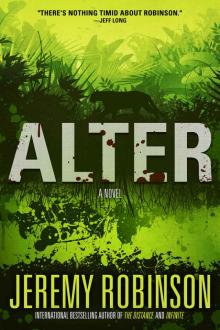 Alter
Alter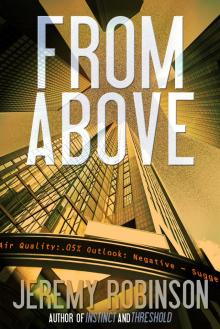 From Above - A Novella
From Above - A Novella Flux
Flux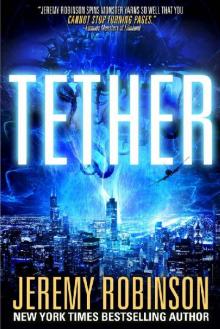 Tether
Tether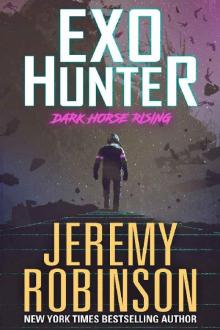 Exo-Hunter
Exo-Hunter Pulse
Pulse Cannibal
Cannibal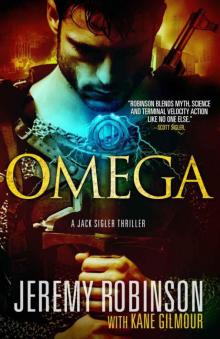 Omega: A Jack Sigler Thriller cta-5
Omega: A Jack Sigler Thriller cta-5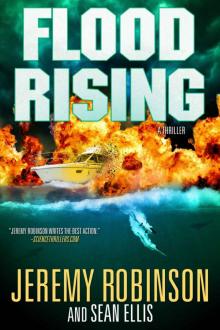 Flood Rising (A Jenna Flood Thriller)
Flood Rising (A Jenna Flood Thriller)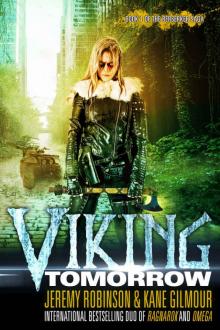 Viking Tomorrow
Viking Tomorrow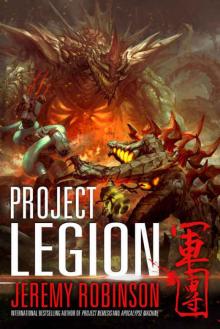 Project Legion (Nemesis Saga Book 5)
Project Legion (Nemesis Saga Book 5) BENEATH - A Novel
BENEATH - A Novel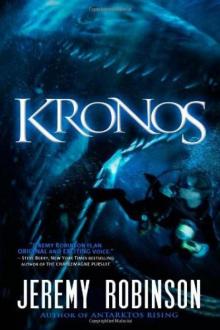 Kronos
Kronos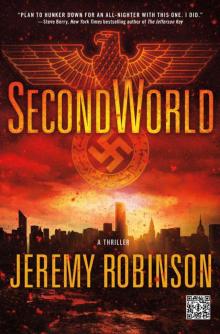 SecondWorld
SecondWorld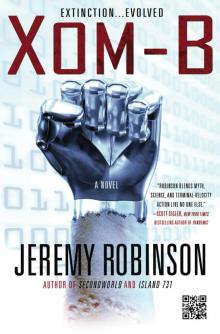 XOM-B
XOM-B Forbidden Island
Forbidden Island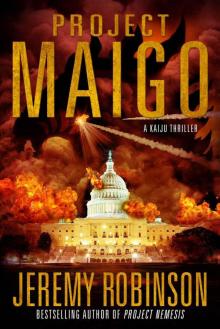 Project Maigo
Project Maigo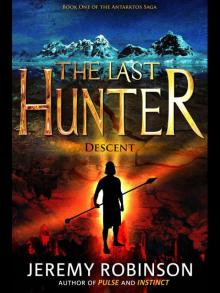 The Last Hunter - Descent (Book 1 of the Antarktos Saga)
The Last Hunter - Descent (Book 1 of the Antarktos Saga)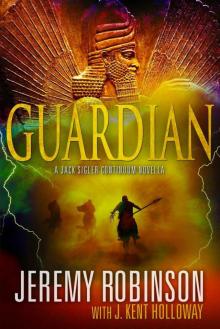 Jack Sigler Continuum 1: Guardian
Jack Sigler Continuum 1: Guardian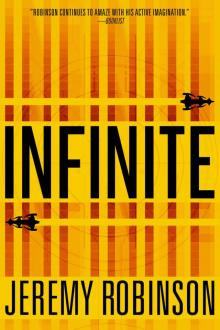 Infinite
Infinite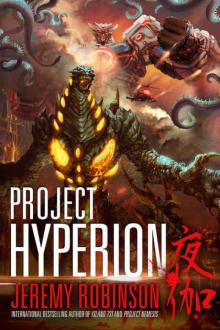 Project Hyperion
Project Hyperion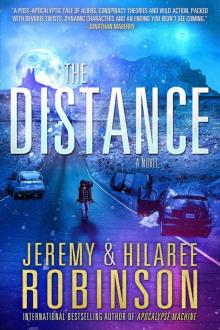 The Distance
The Distance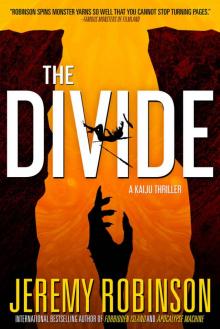 The Divide
The Divide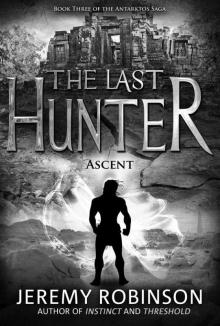 The Last Hunter - Ascent (Book 3 of the Antarktos Saga)
The Last Hunter - Ascent (Book 3 of the Antarktos Saga)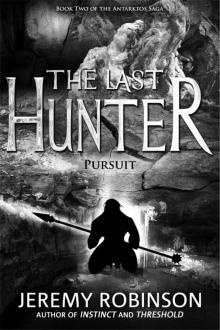 The Last Hunter - Pursuit (Book 2 of the Antarktos Saga)
The Last Hunter - Pursuit (Book 2 of the Antarktos Saga)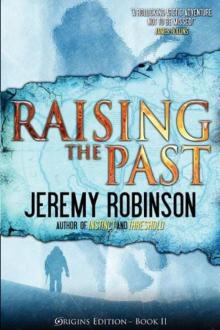 Raising the Past
Raising the Past The Others
The Others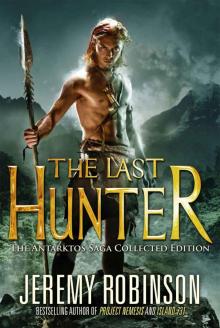 The Last Hunter - Collected Edition
The Last Hunter - Collected Edition Threshold
Threshold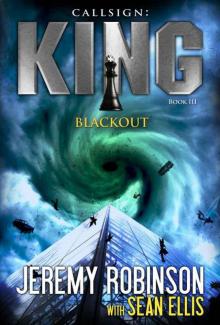 Blackout ck-3
Blackout ck-3 Antarktos Rising
Antarktos Rising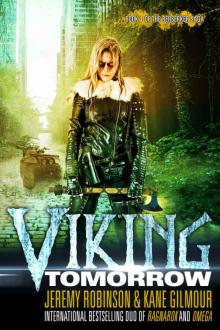 Viking Tomorrow (The Berserker Saga Book 1)
Viking Tomorrow (The Berserker Saga Book 1)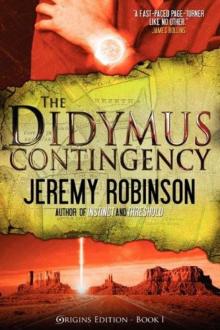 The Didymus Contingency
The Didymus Contingency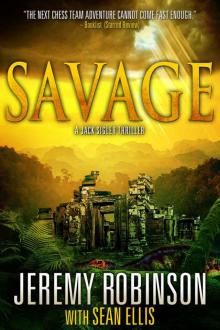 Savage (Jack Sigler / Chess Team)
Savage (Jack Sigler / Chess Team)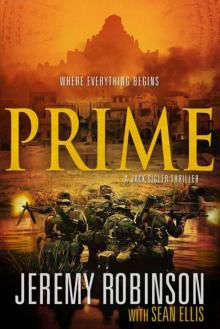 Prime
Prime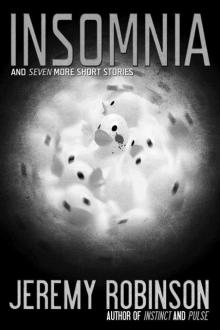 Insomnia and Seven More Short Stories
Insomnia and Seven More Short Stories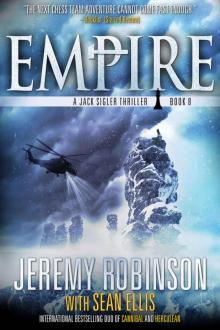 Empire (A Jack Sigler Thriller Book 8)
Empire (A Jack Sigler Thriller Book 8) Unity
Unity Instinct
Instinct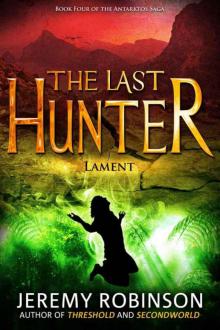 The Last Hunter - Lament (Book 4 of the Antarktos Saga)
The Last Hunter - Lament (Book 4 of the Antarktos Saga)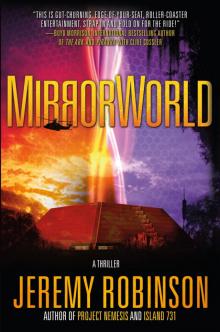 MirrorWorld
MirrorWorld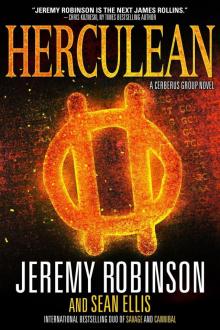 Herculean (Cerberus Group Book 1)
Herculean (Cerberus Group Book 1)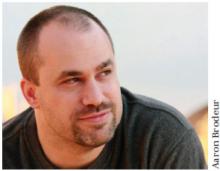 Island 731
Island 731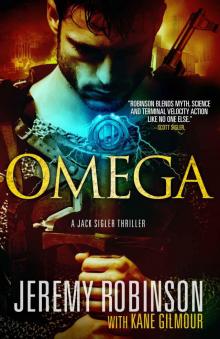 Omega: A Jack Sigler Thriller
Omega: A Jack Sigler Thriller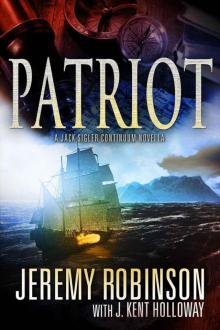 Patriot (A Jack Sigler Continuum Novella)
Patriot (A Jack Sigler Continuum Novella)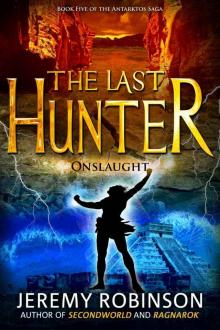 5 Onslaught
5 Onslaught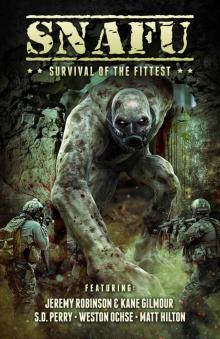 SNAFU: Survival of the Fittest
SNAFU: Survival of the Fittest Helios (Cerberus Group Book 2)
Helios (Cerberus Group Book 2)